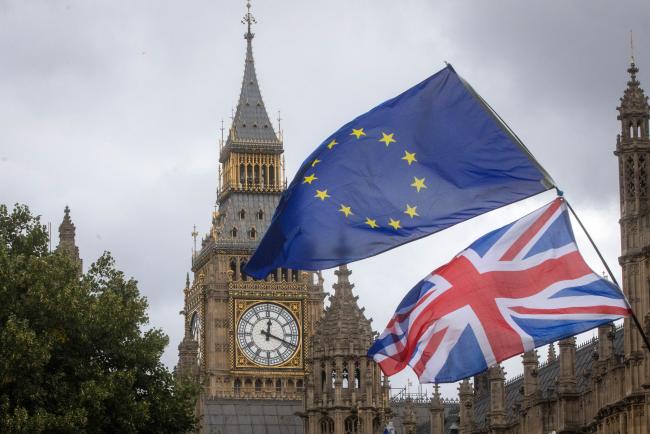(Bloomberg) -- Prime Minister Theresa May’s under-fire government acknowledged the U.K. economic outlook is deteriorating and unexpectedly set aside an extra 3 billion pounds ($4 billion) to prepare for all Brexit outcomes.
Opening his Budget speech in Parliament on Wednesday, Chancellor of the Exchequer Philip Hammond said the Office for Budget Responsibility now sees 2018 economic growth of 1.4 percent compared with the 1.6 percent predicted in March as a result of revised productivity data and headwinds caused by Britain’s vote to quit the European Union. Growth is predicted to be lower than forecast and less than 2 percent in every year through 2021.
The announcement of funding for leaving the European Union shows he’s relented to demands from more pro-Brexit factions of the cabinet to make money available so the U.K. can walk away from divorce talks. It’s also noteworthy that back in March 2016 -- prior to the Brexit referendum -- the OBR predicted much healthier growth of 2.2 percent in 2017 and 2.1 percent in 2018.
“We are determined to ensure that the country is prepared for every possible outcome,” Hammond said. “I stand ready to allocate further sums if and when needed.”
May’s government has been rocked by resignations, rebellions and sluggish progress in the Brexit negotiations, and Hammond sought to strike an optimistic tone while limiting spending to fit the new economic reality.
The chancellor broke with recent precedent by not giving detailed numbers for borrowing over the next five years. He highlighted years where net borrowing has been revised down but glossed over the years of increase that will see the U.K. borrowing an extra 29 billion pounds by 2022.
Record of Failure
“It’s a record of failure with a forecast of more to come,” opposition Labour Party leader Jeremy Corbyn told lawmakers, reminding Hammond that his government had said the deficit would be eradicated by 2015 and was now promising 2025. “Appalling pay, slow growth and rising poverty and this is what the chancellor has the cheek to call a strong economy,” he said.
The Budget coincided with a particularly delicate time in the Brexit talks as May prepares to make a better offer on what the U.K. will pay in order to leave the bloc with both sides engaged in high-stakes diplomacy to try to get a breakthrough at a crunch December summit in Brussels.
Even though Hammond’s ability to offer populist giveaways to win back support lost in June’s catastrophic election was limited, he said there will be an extra 3.75 billion pounds for the National Health Service next year and that he would fund any agreement by Health Secretary Jeremy Hunt to increase nurses’ pay.
|
What Our Economists Say.... “Hammond has described the Budget as one that prepares the country for every possible outcome. In reality, a bad Brexit could easily bust the fiscal rules. If negotiations go well, Hammond’s rainy day fund may become a reserve for pre-election giveaways...” -- Jamie Murray and Dan Hanson, Bloomberg Economics. |
Hammond announced the abolition of stamp duty, a tax on home purchases, for first-time buyers on all properties up to 300,000 pounds. In London, where property is more expensive, it will apply to the first 300,000 pounds of any first home purchase.
The chancellor also froze tax on fuel and alcohol and said money would be available to smooth access to benefits under the flagship Universal Credit program in response to complaints from lawmakers on all sides that the poor were having to wait too long to get help.
Thresholds for paying income tax will be raised to 11,850 pounds for the basic rate of 20 percent and 46,350 pounds for the 40 percent higher rate, Hammond said. He also sped up a reform to property taxes for businesses, which he said will save them 2.3 billion pounds over five years.
Hammond said 44 billion pounds will be earmarked for homebuilding over the next five years. There will be support for programs to build affordable homes and to force through the construction of housing on disused land. Local authorities will also have the power to double taxes on properties left empty.
In the debate following Hammond’s statement, he will be listening for support from his own lawmakers. Corbyn’s comments were a taste of attacks he can expect from the opposition, but with such a slim majority he can’t afford to lose the support of his own side.
There is the possibility that some Tories, itching for a fight, will pounce on any error as a sign of his unsuitability for the job. He’s particularly vulnerable to criticism from euroskeptic Tories who see him as too gloomy about Brexit and partisan in his views.
The chancellor, who voted to remain in the EU in last year’s referendum, has angered pro-Brexit lawmakers by advocating a gradualist approach to leaving the EU and warning of the danger to the economy of a hard break from the bloc. Others have criticized his caution over spending as Labour’s anti-austerity agenda has won support from voters.
However, Hammond’s package of measures gained a cautious welcome from Nicky Morgan, the former Tory cabinet minister who now heads Parliament’s Treasury Committee and is one of the most persistent critics of the government’s Brexit policy.
“Brexit hangs over this place and the U.K. like a cloud,” she told the Commons. “So it was important that today’s budget should show the government’s determination to do more than just announce our path out of the U.K.”
